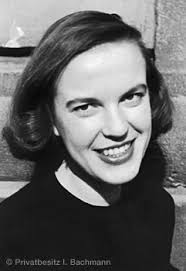Theodor W. Adorno famously stated that there could be no poetry after Auschwitz. ("nach Auschwitz ein Gedicht zu schreiben, ist babarisch.") Yet poets continue to write, and there have been a number of powerful poems dealing with the Holocaust itself. Certainly Paul Celan's Todesfuge is one of the of the most important poems of the 20th century. In 1952 Celan's friend and sometime lover Ingeborg Bachmann read her poem Früher Mittag ("Early Noon") at the Gruppe 47 meeting; it was published the following year in her acclaimed collection Die gestundete Zeit ("Borrowed Time") . While Todesfuge depicts the violence of the death camps directly and with intensifying power, Früher Mittag unfolds in a hushed landscape and approaches the horror of the Holocaust allegorically – the terror is more subtle, but still present "sieben Jahre später" – seven years on. It is one of Bachmann's most important poems – here, to commemorate National Poetry Month and Holocaust Remembrance Day, which falls on April 24 this year.
Früher Mittag
Still grünt die Linde im eröffneten Sommer,
weit aus den Städten gerückt, flirrt
der mattglänzende Tagmond. Schon ist Mittag,
schon regt sich im Brunnen der Strahl,
schon hebt sich unter den Scherben
des Märchenvogels geschundener Flügel,
und die vom Steinwurf entstellte Hand
sinkt uns erwachende Korn.Wo Deutschlands Himmel die Erde schwärzt,
sucht sein enthaupteter Engel ein Grab für den Haß
und reicht dir die Schüssel des Herzens.Eine Handvoll Schmerz verliert sich über den Hügel.
Sieben Jahre später
fällt es dir wieder ein,
am Brunnen vor dem Tore,
blick nicht zu tief hinein,
die Augen gehen dir über.Sieben Jahre später,
in einem Totenhaus,
trinken die Henker von gestern
den goldenen Becher aus.
Die Augen täten dir sinken.Schon ist Mittag in der Asche
krümmt sich das Eisen, auf den Dorn
ist die Fahne gehißt, und auf den Felsen
uralten Traums bleibt fortan
der Adler geschmiedet.Nur die Hoffnung kauert erblindet im Licht.
Lös ihr Fessel. führ sie
die Halde herab, leg ihr
die Hand auf das Aug, daß sie
kein Schatten versengt!Wo Deutschlands Erde den Himmel schwärzt,
sucht die Wolke nach Worten und füllt den Krater mit Schweigen,
eh sie der Sommer im schütteren Regen vernimmt.Das Unsägliche geht, leise gesagt, übers Land:
schon ist Mittag.
The poem begins with a Trakl-like evocation of an idyllic early-summer landscape. The world seems to be slowing recovering from "Germany's sky that blackens the earth." But in the poet's inversion the noonday sun does not bring clarity and understanding but rather forgetting and continuation. The horror doesn't end, and in an inversion of Goethe's Der König von Thule the "executioners of yesterday" are still drinking from the golden cup. Hope cowers in the blinding light, while the shadows threaten to singe the eye that seeks the truth. The silence of the idyll of the opening lines turns out to be the "unspeakable" haunting the land – the search for words futile (" füllt den Krater mit Schweigen") .
See also Ingeborg Bachmann and the Mad Men
Early Noon
Silently the linden greens in incipient summer,
far from the cities there glimmers
the pale brightness of the day moon. Already it’s noon, already a sunbeam flashes in the fountain,
already the fabulous bird’s flayed wing
lifts itself beneath the rubble,
and the hand that’s cramped from casting stones
sinks into the budding wheat.Where Germany’s sky blackens the earth, its beheaded angel seeks a grave for hate and offers you the bowl of the heart.
A handful of pain vanishes over the hill.
Seven years later
it occurs to you again,
at the fountain before the portal, don’t look too deep within,
as your eyes fill with tears.Seven years later,
inside a mortuary,
the hangmen of yesterday drain the golden cup. Your eyes lower in shame.Already it’s noon, in embers
the iron bends, on the thorn
the flag is hoisted, and onto the cliff
of the ancient dream the eagle is welded, remaining forever.Take off hope's chains, lead her down the slope, put your
hand over her eyes–
let no shadow scorch her!
Where Germany's earth blackens the sky,
a cloud looks for words and fills the crater with silence,
before summer hears it call through the scattered rain…
The unspeakable, softly spoken, moves across the land,
Already it's noon.



1 comment
I think Todesfuge is THE most important poem of the 20th Century.
Comments are closed.